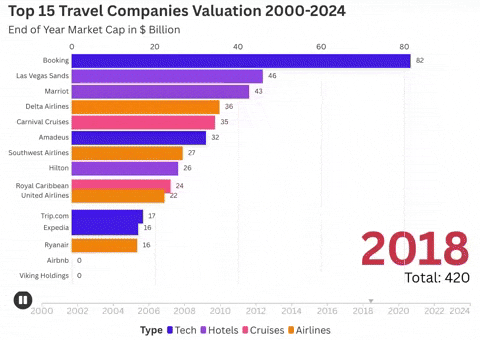This is a guest post by Mario Gavira, Vice President of Global Growth and Brand at Kiwi.com. Mario takes us through how the travel industry’s value creation has evolved over the last 25 years, using market cap trends of the top public companies to highlight who’s winning, how the game has changed, and what might come next.
I’ve been lucky to know Mario since our time working together at eDreams Odigeo, and it’s always a pleasure to learn from his sharp perspective on where the industry is headed. Big thanks to him for sharing this with us.
The digital revolution in the travel industry over the last 25 years has been like watching a time-lapse video of a cityscape evolving from horse-drawn carriages to flying cars. By examining annual market capitalization trends across the top 15 publicly listed travel companies, we uncover not merely financial fluctuations but the tectonic platform shifts that have reshuffled the industry’s landscape. View the 25-year timeline evolution here.
Which key takeaways can we uncover? Let’s dive into this fascinating tale of bytes, bookings, and billion-dollar valuations.
The Great Rewiring: From Analog to Digital Dominance
In 1995, with the World Wide Web on the verge of revolutionizing humanity, Booking Holding and Airbnb had not been founded yet.
Fast-forward to today, and Booking and Airbnb not only dominate the ranking of the 15 largest publicly listed travel companies worldwide in market cap but command a whopping one-third of the aggregated travel market valuation in the leaderboard ($250B out of $760B).
This wasn’t merely a changing of the guard; it was a complete paradigm shift in how value was created and captured in travel. Physical assets, once the industry’s gold standard, became almost liability-like in their capital-intensive nature compared to the asset-light models of digital platforms.
Among the tech players, Amadeus represents the sole pre-internet technology company to break into the exclusive top 15 club. The GDS, founded during the mainframe era has managed to adapt and surf the different tech disruption waves remaining deeply woven into the industry’s distribution ecosystem.
The Phoenix Paradox
The travel industry’s recent history offers a masterclass in how seismic shocks don’t just separate winners from losers—they fundamentally rewrite the rules of value creation.
In the aftermath of the 2008 financial crisis, Booking Holdings executed perhaps the most spectacular value creation sprint in travel history, leaping from $3 billion to a staggering $19.6 billion in just two years
With a nearly unlimited inventory of discounted rooms at their disposal due to plummeting occupancy rates and Google search becoming travel demand’s new front door, Booking’s formula was deceptively simple yet devastatingly effective.
For every ad dollar the OTA pumped into Google, they could predict sales and ROI down to decimal points, and therefore match travel demand with unsold hotel inventory in a highly profitable and scalable way
Pandemic Alchemy: Airbnb’s Impossible IPO
If the financial crisis was instructive, the pandemic offered a doctoral-level seminar in counterintuitive market dynamics. At the precise moment when global travel had effectively paused, Airbnb pulled off what should have been categorically impossible.
The largest travel IPO in history. During a pandemic. For a company that had been forced to lay off a quarter of its staff just a few months earlier.
The $47 billion initial valuation was shocking enough, but when the share price more than doubled on day one—pushing toward that mythical $100 billion mark—it felt like watching reality itself bend.
What makes this truly fascinating isn’t just the numbers, but the timing. Airbnb didn’t succeed despite the pandemic; in many ways, it succeeded because of it. The crisis turbocharged digital adoption and triggered cultural shifts around remote work, extended stays, and domestic travel—all areas where Airbnb’s model held natural advantages over traditional accommodation.
What strikes me most about these two crisis points is how they reveal a profound truth about adaptive advantage. Traditional travel companies approach crises with a defensive playbook—cutting costs, preserving cash, waiting for normality to return. The companies that emerged as post-crisis winners approached the same events with paradoxical thinking: not “how do we survive until things get back to normal?” but “how do we position for the new normal that hasn’t arrived yet?”
The Missing Travel Categories Enigma
Two sectors highlight a disconnect between industry buzz, venture capital, business significance and market valuation:
Tours & Activities, or “Experience” players: despite attracting considerable venture capital and generating endless conference panel discussions, the sector seems stuck in remaining travel’s perpetual “next big thing.”
GetYourGuide, Klook, and Viator have all carved out respectable positions in this fragmented landscape. Yet, none appear poised to achieve the operational scale or consumer mindshare needed to play with the industry’s heavyweights.
Corporate Travel players: Perhaps most surprising is the absence of corporate travel players, given that total global business travel spending reached $1.5 trillion in 2024, surpassing pre-pandemic levels.
Top TMC players (Amex Travel, CWT, etc) have built empires on high-touch service and legacy GDS relationships, falling behind the curve in tech adoption. The question remains whether legacy players in constant consolidation processes and “digital transformations” will eventually rise from the ashes and unlock market value or whether a new generation of tech-first TMCs (Navan, TravelPerk, etc) will manage to scale fast enough to displace the incumbents.
The Physics of Industry Transformation
What this market cap tracking reveals isn’t just who won and lost but the fundamentally different physics that govern success in the digital revolution. Traditional travel companies operated like battleships—powerful but slow to change course. Internet-era companies functioned more like speedboats, with greater maneuverability but still following recognizable patterns.
Today’s travel tech giants operate almost like quantum particles—appearing simultaneously in multiple spaces and dimensions, redefining what “travel company” even means. Is Airbnb a hospitality company, a marketplace, a community platform, or all three simultaneously? The answer seems to be yes to all three. And this is just the beginning, according to their CEO’s vision: in Airbnb’s last quarterly earnings Brian Chesky announced plans to launch one or two new endeavors every year for the next five years, with each one eventually making $1 billion in revenue
As someone who’s lived through these transformations over the last 25 years, the market cap progression isn’t just interesting data—it’s a testament to how quickly technological evolution has profoundly reshaped the entire travel ecosystem.
One can only wonder what the AI tsunami will do to this reshuffled deck of travel titans. If history is any guide, there’s someone in a garage somewhere right now building whatever comes next. But will they outmaneuver the existing travel titans, or will the incumbents leverage their deep pockets and distribution power and reinvent themselves? Only time will tell.







